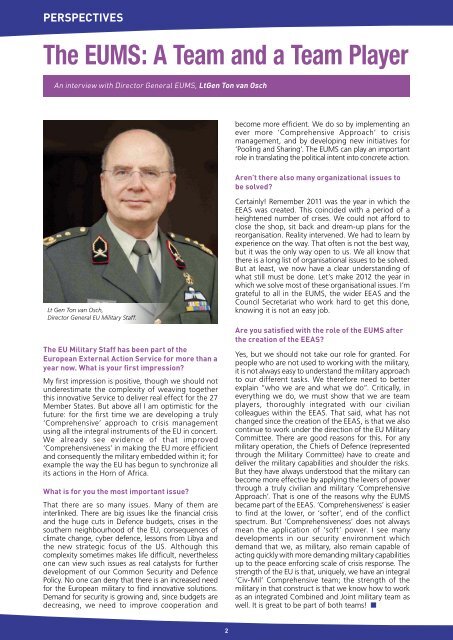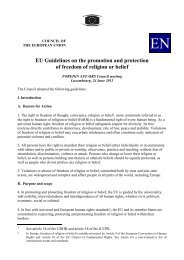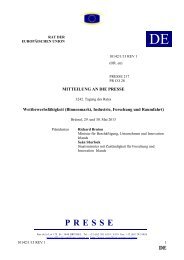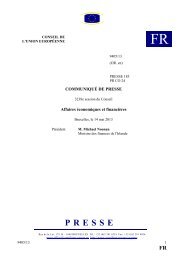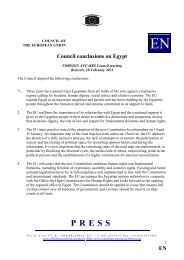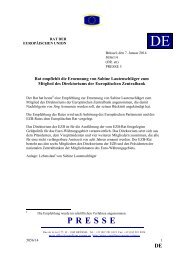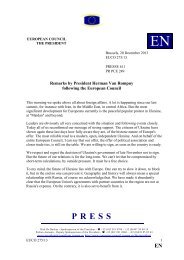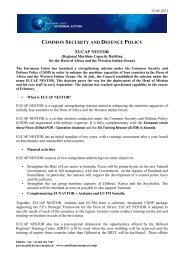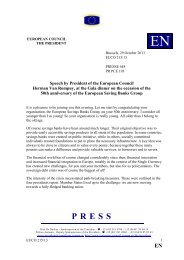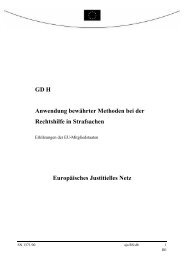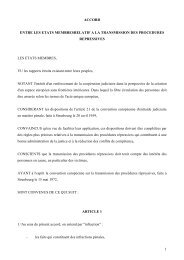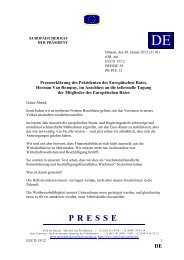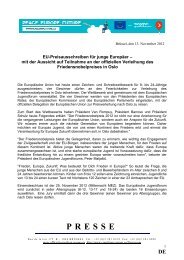Impetus - Europa
Impetus - Europa
Impetus - Europa
Create successful ePaper yourself
Turn your PDF publications into a flip-book with our unique Google optimized e-Paper software.
PERSPECTIVES<br />
The EUMS: A Team and a Team Player<br />
An interview with Director General EUMS, LtGen Ton van Osch<br />
Lt Gen Ton van Osch,<br />
Director General EU Military Staff.<br />
The EU Military Staff has been part of the<br />
European External Action Service for more than a<br />
year now. What is your first impression?<br />
My first impression is positive, though we should not<br />
underestimate the complexity of weaving together<br />
this innovative Service to deliver real effect for the 27<br />
Member States. But above all I am optimistic for the<br />
future: for the first time we are developing a truly<br />
‘Comprehensive’ approach to crisis management<br />
using all the integral instruments of the EU in concert.<br />
We already see evidence of that improved<br />
‘Comprehensiveness’ in making the EU more efficient<br />
and consequently the military embedded within it; for<br />
example the way the EU has begun to synchronize all<br />
its actions in the Horn of Africa.<br />
What is for you the most important issue?<br />
That there are so many issues. Many of them are<br />
interlinked. There are big issues like the financial crisis<br />
and the huge cuts in Defence budgets, crises in the<br />
southern neighbourhood of the EU, consequences of<br />
climate change, cyber defence, lessons from Libya and<br />
the new strategic focus of the US. Although this<br />
complexity sometimes makes life difficult, nevertheless<br />
one can view such issues as real catalysts for further<br />
development of our Common Security and Defence<br />
Policy. No one can deny that there is an increased need<br />
for the European military to find innovative solutions.<br />
Demand for security is growing and, since budgets are<br />
decreasing, we need to improve cooperation and<br />
2<br />
become more efficient. We do so by implementing an<br />
ever more ‘Comprehensive Approach’ to crisis<br />
management, and by developing new initiatives for<br />
‘Pooling and Sharing’. The EUMS can play an important<br />
role in translating the political intent into concrete action.<br />
Aren’t there also many organizational issues to<br />
be solved?<br />
Certainly! Remember 2011 was the year in which the<br />
EEAS was created. This coincided with a period of a<br />
heightened number of crises. We could not afford to<br />
close the shop, sit back and dream-up plans for the<br />
reorganisation. Reality intervened. We had to learn by<br />
experience on the way. That often is not the best way,<br />
but it was the only way open to us. We all know that<br />
there is a long list of organisational issues to be solved.<br />
But at least, we now have a clear understanding of<br />
what still must be done. Let’s make 2012 the year in<br />
which we solve most of these organisational issues. I’m<br />
grateful to all in the EUMS, the wider EEAS and the<br />
Council Secretariat who work hard to get this done,<br />
knowing it is not an easy job.<br />
Are you satisfied with the role of the EUMS after<br />
the creation of the EEAS?<br />
Yes, but we should not take our role for granted. For<br />
people who are not used to working with the military,<br />
it is not always easy to understand the military approach<br />
to our different tasks. We therefore need to better<br />
explain “who we are and what we do”. Critically, in<br />
everything we do, we must show that we are team<br />
players, thoroughly integrated with our civilian<br />
colleagues within the EEAS. That said, what has not<br />
changed since the creation of the EEAS, is that we also<br />
continue to work under the direction of the EU Military<br />
Committee. There are good reasons for this. For any<br />
military operation, the Chiefs of Defence (represented<br />
through the Military Committee) have to create and<br />
deliver the military capabilities and shoulder the risks.<br />
But they have always understood that the military can<br />
become more effective by applying the levers of power<br />
through a truly civilian and military ‘Comprehensive<br />
Approach’. That is one of the reasons why the EUMS<br />
became part of the EEAS. ‘Comprehensiveness’ is easier<br />
to find at the lower, or ‘softer’, end of the conflict<br />
spectrum. But ‘Comprehensiveness’ does not always<br />
mean the application of ‘soft’ power. I see many<br />
developments in our security environment which<br />
demand that we, as military, also remain capable of<br />
acting quickly with more demanding military capabilities<br />
up to the peace enforcing scale of crisis response. The<br />
strength of the EU is that, uniquely, we have an integral<br />
‘Civ-Mil’ Comprehensive team; the strength of the<br />
military in that construct is that we know how to work<br />
as an integrated Combined and Joint military team as<br />
well. It is great to be part of both teams! n


